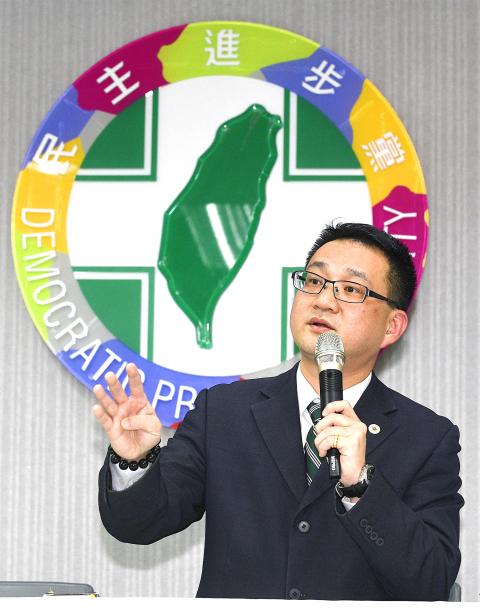President-elect Tsai Ing-wen (蔡英文) yesterday said that the most important issue for the nation to deal with in its attempt to join the Trans-Pacific Partnership (TPP) is to adjust its industrial and trade policies, as well as its laws.
“Tsai said that the TPP is no doubt a high quality free-trade agreement [FTA] with 30 chapters that, besides cuts in tariffs, focus mostly on coordination between laws, governance and administrative procedures,” Democratic Progressive Party spokesman Ruan Jhao-syong (阮昭雄) said at a news conference following the party’s weekly Central Standing Committee meeting in Taipei, which focused on gaining membership of the TPP.
“For Taiwan to have innovations and upgrades in its economy, many laws need major revisions to be in line with international standards and this is more important than deciding whether to make concessions during negotiations [to join the TPP],” Ruan quoted Tsai as saying.

Photo: Chen Chih-chu, Taipei Times
Ruan said that the priorities of the new government would be to implement reforms to the nation’s economic structure.
“The DPP has begun to prepare for global trade negotiations and a special TPP task force headed by [DPP think tank the New Frontier Foundation executive director] Lin Chuan (林全) has been set up,” Ruan said. “The task force is to actively push for bilateral FTAs, as well as regional economic and trade agreements for the ‘new southward policy.’”
The TPP taskforce under the DPP's New Frontier Foundation think tank was created in December 2014.
Tsai made the remarks after Chung-hua Institution for Economic Research deputy executive director Lee Chun (李淳) gave a special presentation on revisions to the law and economic reforms as the nation seeks to join the TPP.
TPP membership was one of Tsai’s most important trade and economic policies during the presidential election campaign.

DAREDEVIL: Honnold said it had always been a dream of his to climb Taipei 101, while a Netflix producer said the skyscraper was ‘a real icon of this country’ US climber Alex Honnold yesterday took on Taiwan’s tallest building, becoming the first person to scale Taipei 101 without a rope, harness or safety net. Hundreds of spectators gathered at the base of the 101-story skyscraper to watch Honnold, 40, embark on his daredevil feat, which was also broadcast live on Netflix. Dressed in a red T-shirt and yellow custom-made climbing shoes, Honnold swiftly moved up the southeast face of the glass and steel building. At one point, he stepped onto a platform midway up to wave down at fans and onlookers who were taking photos. People watching from inside

MAKING WAVES: China’s maritime militia could become a nontraditional threat in war, clogging up shipping lanes to prevent US or Japanese intervention, a report said About 1,900 Chinese ships flying flags of convenience and fishing vessels that participated in China’s military exercises around Taiwan last month and in January last year have been listed for monitoring, Coast Guard Administration (CGA) Deputy Director-General Hsieh Ching-chin (謝慶欽) said yesterday. Following amendments to the Commercial Port Act (商港法) and the Law of Ships (船舶法) last month, the CGA can designate possible berthing areas or deny ports of call for vessels suspected of loitering around areas where undersea cables can be accessed, Oceans Affairs Council Minister Kuan Bi-ling (管碧玲) said. The list of suspected ships, originally 300, had risen to about

A Vietnamese migrant worker yesterday won NT$12 million (US$379,627) on a Lunar New Year scratch card in Kaohsiung as part of Taiwan Lottery Co’s (台灣彩券) “NT$12 Million Grand Fortune” (1200萬大吉利) game. The man was the first top-prize winner of the new game launched on Jan. 6 to mark the Lunar New Year. Three Vietnamese migrant workers visited a Taiwan Lottery shop on Xinyue Street in Kaohsiung’s Gangshan District (崗山), a store representative said. The player bought multiple tickets and, after winning nothing, held the final lottery ticket in one hand and rubbed the store’s statue of the Maitreya Buddha’s belly with the other,

Japan’s strategic alliance with the US would collapse if Tokyo were to turn away from a conflict in Taiwan, Japanese Prime Minister Sanae Takaichi said yesterday, but distanced herself from previous comments that suggested a possible military response in such an event. Takaichi expressed her latest views on a nationally broadcast TV program late on Monday, where an opposition party leader criticized her for igniting tensions with China with the earlier remarks. Ties between Japan and China have sunk to the worst level in years after Takaichi said in November that a hypothetical Chinese attack on Taiwan could bring about a Japanese